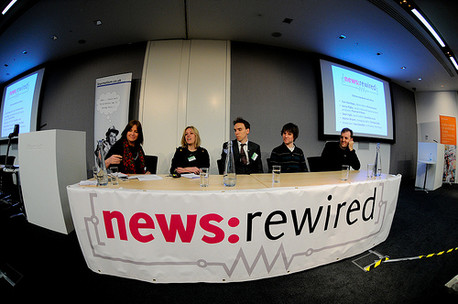The panel featured Jenny Rigby, social media and special projects producer at Channel 4 News; Sean Ingle, sports editor at Guardian.co.uk; Martin Bryant, managing editor at The Next Web; and Tom Standage, digital editor at the Economist.

Here are five of the key discussion points covered during the session:
1. Accuracy over speed
Social media has turned breaking news into a minefield of rumours and false reports, further muddying the waters of truth in a situation that is inherently uncertain.
This should not however, have an impact on the journalistic basics of checking for accuracy, said Rigby, making a point quickly supported by Ingle, who added that "being right and being accurate is always more important than speed."
Martin Bryant highlighted the recent Boston marathon bombings as a case in point.
"The people who have earned my respect," he said, "are the ones that have held back and checked, used multiple sources."
2. Transparency
In a live situation, being transparent is absolutely vital, Ingle said, because for a large news organisation being wrong can seriously tarnish reputations.
"A liveblog is very cut and thrust and you have that leeway, in the heat of battle so to speak, to say that something might not be 100 per cent accurate," he said.
If the information is coming in from another news organisation, added Rigby, then it will always be attributed as such, rather than being presented as confirmed independently.
Attributing and linking back to sources is also just as important when the news is not live, Ingle said. In his early days as a journalist he was told by a managing editor to always remember the reader and refer back to past events or posts.
Bryant added that while there are some sites or stories in which the author will only reference where the information came from at the very end, he did not agree with this approach.
"Hiding it [the source] at the bottom feels wrong to me," he said. "Having it in the body of the text allows the reader to look around and see what you've added, if anything."
3. Adding value
The topic of adding value is particularly important online, as stories and articles can spread much quicker than in traditional media without necessarily being attributed. The relative merits of this practice proved to be a point of amicable disagreement for the panel.
Bryant described the practice as the "shallow re-blogging" of content while Ingle said that it would be ignoring commercial reality for news organisations to just link to someone else's story rather than writing its own version to get pageviews on their own site.
Yet from an ethical perspective the panel agreed that adding value to a discussion or news story, rather than simply performing 'churnalism', should be the standard to follow for professional journalists.
4. Corrections
Everybody makes mistakes – whether its a small spelling mistake or a serious oversight in reporting – and the panel agreed that making corrections and acknowledging mistakes is an important practice.
Tom Standage described how, if the Economist makes a really "egregious" mistake then it will always be acknowledged in print, although one particularly wry apology went viral after suggesting the publishers were "drunk on the job".
The practice of deleting tweets was "poor form" said Bryant, explaining that an "update" or "correction" headline should be given in order to be as transparent as possible.
5. Dealing with trolls
The issue of abuse in forums or comment threads has long been a problem for online publishers, whether between readers or directed at a writer.
"Don't feed the trolls," Ingle advised. "That's a good way to start. If someone is abusing you then if you respond in a polite way they may back down."
Ingle, as a sports journalist, said that he knows some writers who will change what they write and soften their words when it comes to some topics in order to avoid abuse.
So should comments only be allowed when the commenters are clearly identifiable, as with the Facebook commenting model?
"My view is that you should encourage people to use their names but give them the option," said Bryant. "Some people can make very valid points but only when they say so under anonymity."
In some cases it may take a small amount of intervention by the journalist, said Standage.
"Some call it the 'adult-in-the-room effect'," he said. "Just a small amount of intervention in the comment thread is enough to make people think that there is someone watching and moderating and abuse or bad behaviour will go down."
Free daily newsletter
If you like our news and feature articles, you can sign up to receive our free daily (Mon-Fri) email newsletter (mobile friendly).
Related articles
- Sky News producer and psychotherapist James Scurry: 'Journalists are a decade behind the latest knowledge about mental health'
- New guidelines call for the abolition of kill fees and fair payment practices for freelance journalists
- Seasoned reporting: charting changing tastes in the field of food journalism
- The Journalism Trust Initiative is rewarding transparent and trustworthy news
- How to report on homicide and interview grieving families









